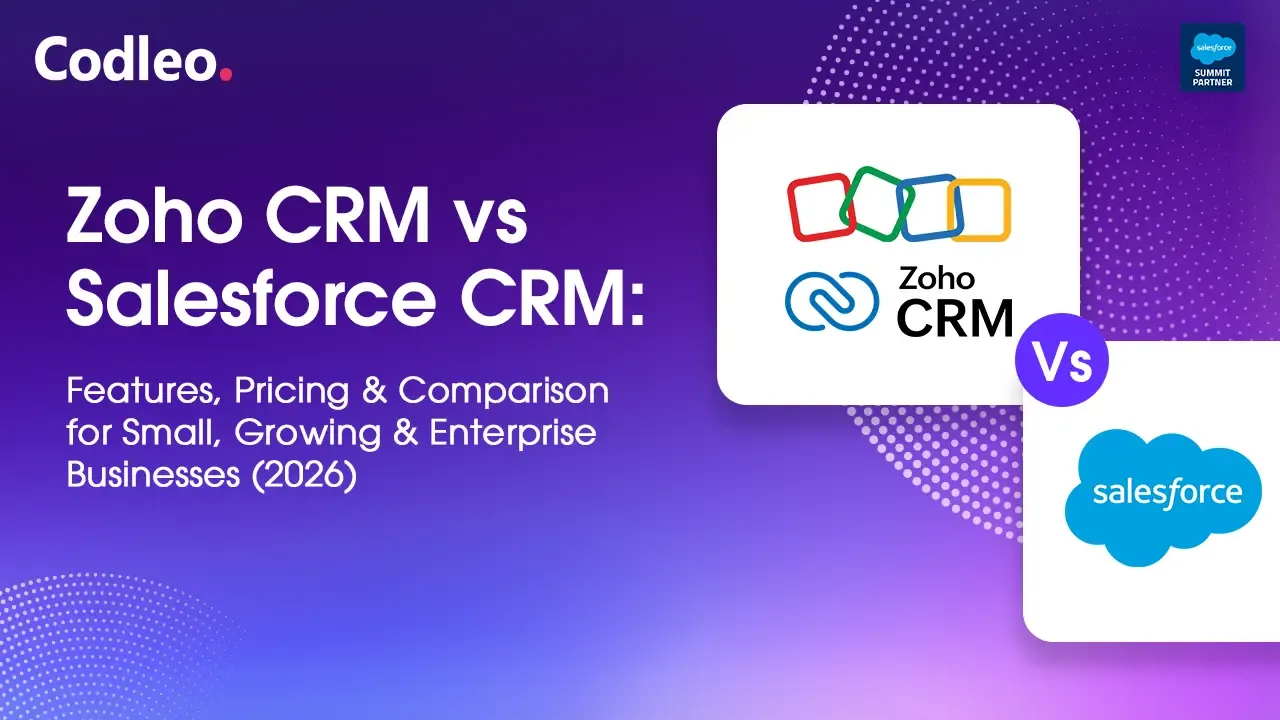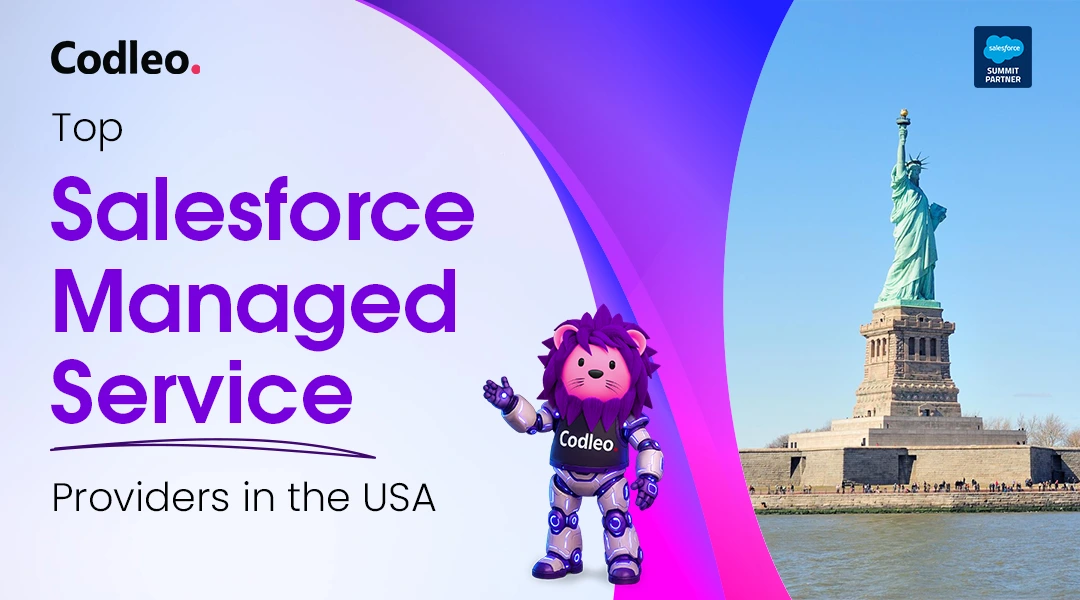Publish date:
Regarding Salesforce, the right consultant can make your implementation smoother, improve your workflows, and help you maximize your investment. But with so many choices, picking the right partner can be tough. How do you tell the true experts from those who might create more problems?
We will outline the main factors to consider when choosing a Salesforce consultant. This will help you find someone who fits your business needs and supports your long-term success.
Define your goals and needs.
Before looking for a Salesforce consultant, ensure you know what you need. Even the best consultant may not deliver the right results if you don't have clear goals. Ask yourself:
Are you using Salesforce for the first time?
If yes, you will need a consultant to help with setup, data migration, and user training.
Do you need help with optimization or a specific project?
Find a consultant with strong technical skills if you need custom development, automation, advanced reporting, or third-party integrations.
Do you need cleanup and ongoing maintenance?
If your Salesforce instance has issues like duplicate data or inefficient processes, a consultant focused on optimization and long-term care can assist you.
Who will manage Salesforce after the project?
Defining ownership is crucial. Will an internal team take over, or will you need outside support? If you are moving to an internal admin, ensure they have the right skills and understand the system's changes.
How will you ensure a smooth transition after the project?
A well-documented Salesforce setup helps prevent knowledge gaps and keeps things running smoothly. Sweep automatically tracks changes, allowing internal teams to take over with confidence.
Before contacting Salesforce consultants, create a clear scope of work that includes a timeline, budget, and project ownership. Outline your objectives, key issues, and desired outcomes. This will help you find a consultant with the right expertise and ensure they can meet your needs.
Look for relevant expertise.
When hiring a consultant, choose someone who can guide you strategically, not just follow your instructions. They should suggest improvements and best practices, even if it means challenging your ideas to help you find the best long-term solutions.
Don't just trust their website or sales pitch—ask for recommendations from the Salesforce community, your account manager, or others who have worked with them. Make sure they have completed projects similar to yours and can meet your specific needs.
When assessing potential consultants, prioritize those with experience in your industry, the right technical skills, and a successful history with the Salesforce products you use.
Industry expertise
Every industry has its processes, compliance needs, and best practices. A consultant experienced in your industry will understand your challenges and know how to set up Salesforce to meet your goals.
For instance, a consultant with a background in SaaS will understand subscription revenue models, while one experienced in healthcare will know about HIPAA compliance and managing patient data.
Certifications and technical knowledge
Salesforce offers many certifications that show a consultant's expertise in different areas. While certifications don't guarantee success, they indicate technical skills and a commitment to keeping up with Salesforce's best practices.
Look for consultants with relevant certifications, such as:
-
Salesforce Administrator – This is for general system management and setup.
-
Salesforce Developer – For custom coding, automation, and integrations.
-
Salesforce Architect – For complex setups and system design.
-
Specialty Certifications – Such as Marketing Cloud, CPQ, or Pardot, based on your needs.
Proven experience with your specific Salesforce products
Salesforce has a wide range of products; not every consultant is familiar with them. Ensure the consultant has hands-on experience with your business's specific Salesforce tools.
Request case studies or client references showing their success with:
-
Sales Cloud – For automating sales processes, managing pipelines, and forecasting.
-
Service Cloud – For customer support, case management, and service automation.
-
Marketing Cloud & Pardot – For marketing automation, nurturing leads, and managing campaigns.
-
Revenue Cloud (CPQ & Billing) – For pricing, quoting, and revenue operations.
Evaluate communication and collaboration skills.
A good Salesforce consultant should feel like part of your team, not just a vendor. Besides technical skills, the key to success is their ability to communicate clearly, work well with you, and stay involved throughout the project.
Here’s what to look for:
Ability to Explain Technical Concepts Simply
Salesforce can become complicated quickly. A good consultant should be able to explain technical terms clearly. They should break down topics like automation, data models, and integration setups, making it easy for everyone in your organization to understand what is happening and why it matters.
If a consultant cannot explain their recommendations in a way your team understands, you may rely on them for help. This can create a knowledge gap, making your team dependent on them to manage the technical issues they create rather than empowering your team to use Salesforce effectively.
Hello, Apex trigger ‘DoNotDelete_v2_FINAL’—what do you even do? If your consultant leaves you with unclear code and no explanation, you will struggle to resolve the technical problems they leave you with.
Project Management Skills and Collaborative Approaches
Salesforce projects often involve many people across sales and marketing, customer support, and IT. A consultant should have strong project management skills to keep everything on track, manage timelines, and coordinate with different teams.
Look for consultants who maintain clear, up-to-date documentation. This helps share knowledge and reduces reliance on a single person. They should also provide clear goals and deadlines and keep everyone aligned with regular updates and check-ins.
Transparency and Knowledge Sharing
A great consultant not only provides solutions but also makes sure your team understands them. Before signing a contract, consider these questions:
-
How will they document their work so your team stays informed?
-
Do they offer training sessions or knowledge transfer?
-
Will their solutions be easy for your internal team to maintain, or will they create complexity that only they can handle?
A good consultant documents all workflows, configurations, and processes, enabling your team to manage later and improve the system.
Consider Budget and ROI
Cost is essential when hiring a Salesforce consultant, but don't just look at the price. Think about what you will receive. Instead of focusing only on cost, ask: What will this consultant do for my business? Look for clear deliverables, measurable returns on investment (ROI), and long-term benefits. Spending more at the start can save you time and money later.
Understand Their Pricing Model
Consultants usually charge by the hour, by project, or on a retainer basis. Make sure their pricing matches your needs and budget. Hourly rates can add up quickly, while project-based pricing gives you more certainty. Retainers work well for ongoing support.
Ask How They Measure ROI
A good consultant connects their work to business results. Ask how they track success—whether they focus on improving sales efficiency, increasing user adoption, or reducing administrative workload. Clear key performance indicators (KPIs) ensure you receive real value.
Be Careful with Low Prices
If a consultant's rates seem too good to be true, they probably are. Cheap providers may cut corners, lack experience, or create tech problems that only they can fix. Make sure their pricing includes clear deliverables and focuses on long-term results.
Balancing cost with expertise helps you find a consultant who creates real impact, not just a quick fix. While cost matters, it’s essential to consider the long-term benefits and avoid choosing low-quality to save money. Remember, "You get what you pay for."
Many businesses have unfinished or faulty Salesforce installations, leading to extra costs and inefficiencies. To avoid this, choose a consultant who values thorough documentation, process alignment, and solid implementation.
Communication issues and poor documentation can slow progress even with the best consultant. Sweep provides AI-powered documentation, process mapping, and dependency tracking to ensure your Salesforce setup is well documented. This allows for smooth teamwork between your internal staff and external consultants.
How to Choose a Salesforce Consulting Partner
When selecting a Salesforce consulting partner, you have several resources to consider:
-
Research on Your Own: Going through many discovery sessions can take time and may leave you confused.
-
Ask Your Salesforce Account Executive: They can provide unbiased recommendations.
-
Trust Branding: Pay attention to consultancies with a strong brand or good market visibility.
-
Ask Your Network: Reach out to others in similar organizations for their suggestions.
-
Consider Price: Lower prices can make it hard to understand what’s included in the scope of work (SoW). Higher costs might reflect more services, while lower costs may not fully address your needs.
-
Look at Certifications: Consider the number of credentials held by the consultants.
-
Check AppExchange Reviews: The number of reviews on this marketplace can guide your selection.
While these sources can be helpful, they might lead to confusion or bias. This can jeopardize your CRM project, which could ultimately fail.
Are the Right Consultants Easy to Find?
As we've noted, the Salesforce consultancy landscape is complex. New system integrators (SIs) regularly emerge and are eager to succeed.
Many capable SIs can deliver excellent work but may not be well-known, limiting choices for customers and Salesforce account executives.
A Better Way to Select a Salesforce Consulting Partner
How can you find the best SIs for your project? A more systematic approach can help.
Codleo uses a special algorithm to analyze the SI market and vet each SI on its platform.
They categorize SIs based on:
-
Skills and expertise Certifications
-
Ratings from completed projects
-
Methodology and tools used
-
Market sentiment analysis
-
Support for specific project needs
After gathering this information, Codleo shares it with clients. Clients provide project requirements, and Codleo enters them into its platform. The results are tailored to connect the right resources to your project, ensuring fair cost and quality.
If you need help during or after an implementation, Sweep promotes clear communication. Our professional services team can guide you through the process, ensuring efficient Salesforce implementation and ongoing Salesforce support.
Want to work with a partner dedicated to your long-term Salesforce success? Contact us to learn more.
Also, read: How to evaluate the best Salesforce Consultants















